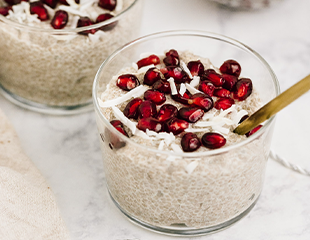While society is finally starting to normalize acne, dealing with breakouts can be extremely frustrating. If you struggle with acne-prone skin, you may want to consider taking a closer look at your diet. Keep in mind numerous factors play a role in the overall health of your skin (hello, hormones, stress, gut health, etc!), but what you eat can play a powerful role in controlling and reducing unwanted breakouts.
If you're looking to clear up your skin, incorporating certain nutrients while reducing your intake of certain foods significantly may help you achieve optimal skin health. Keep reading to find out how to eat for acne-prone skin!
.png.aspx)
Skin-Supporting Foods
Start with A Balanced Foundation
The foundation for healthy skin starts from nourishing your body on a cellular level. Focus on a balanced foundation of protein, healthy fats, complex carbohydrates, especially in the form of vegetables and fruits. This will help support your overall health and skin by ensuring you are getting the essential nutrients daily as well as supporting stabilized blood sugar.
In addition to a balanced diet, several studies suggest that incorporating certain foods rich antioxidants, vitamins A and E, zinc, and omega-3 fatty acids are linked to lower levels of acne. Let’s take a closer look at each of these skin supporting nutrients.
Antioxidants
Since acne is an inflammatory skin condition, reducing inflammation is one way to address breakouts. The best way to do this is by incorporating antioxidant-rich foods. Antioxidants are compounds found in foods that reduce free radicals, which are molecules that the body produces as a reaction to certain cellular stresses. Excess free radicals can lead to inflammation. By filling your plate with colorful vegetables and fruits that are excellent sources of antioxidants, you help tame inflammation and reduce acne symptoms.
Research shows that a wide variety of plant-based foods deliver anti-inflammatory antioxidants and other vital skin-supportive nutrients. These include vitamin C, selenium, vitamin A, Vitamin E, manganese, zeaxanthin among others phytonutrients like flavonoids and polyphenols.
By incorporating a rainbow of fruits and vegetables and getting in as much variety of produce as possible, you can feel confident that you're getting a range of antioxidants to help nourish your skin by addressing some of acne’s root causes, like inflammation and cell turnover.
Vitamin A + E
If you’re suffering from breakouts, increasing your intake of foods containing vitamin A and E (which also act as antioxidants!) may help lessen the severity of your. Research shows that low levels of vitamins A and E seem to be linked to severe cases of acne. Foods rich in Vitamin A include carrots, pumpkin, sweet potatoes, butternut squash, mangoes, spinach, cantaloupe, greens, kale andSwiss chard. To increase your daily vitamin E intake try more incorporating nuts, seeds, olives, spinach, and asparagus. which are all good sources of vitamin E.
Zinc
This essential mineral plays an important role in cellular growth, hormone production, metabolism, and immune function. It’s also one of the most well-studied nutrients in regards to acne. Some research suggests that people with acne tend to have lower levels of zinc in their blood than those with clear skin. Luckily you can easily add zinc to your diet by including pumpkin seeds, lentils, beans, oysters, meat and poultry, which are some of the best sources of zinc,
Omega-3s
Arguably one of the most important healthy fats, omega-3s have a multitude of health benefits, including supporting healthy skin. Omega-3 fatty acids in the form of eicosapentaenoic acid (EPA) and docosahexaenoic acid (DHA) have been shown to decrease inflammation, which may reduce the risk of acne. In one study, 45 individuals with acne were given omega-3 fatty acid supplements containing both EPA and DHA daily. After 10 weeks, they saw a significant decrease in their acne.
Unfortunately, most individuals aren’t getting enough omega-3s. Since you must get these fats from your diet, it’s important to consume omega-3 fatty acids by incorporating omega-3-rich foods like salmon, sardines, anchovies, walnuts, chia seeds, and ground flax seeds. You can also incorporate a fish oil or plant-based omega-3 supplement to ensure you’re getting enough of these essential fatty acids daily.
Water
You can’t talk about skin health without mentioning water! Staying hydrated is key to replenishing water in the cells to lock in moisture. This helps keep your skin soft and subtle. This also helps support your kidneys ensure your body flushing out waste properly.
Be Mindful of These Foods
While it’s more important to focus on what you can add to your diet, you may consider reducing or eliminating a few foods to better understand how they affect your skin. Since the research is inconclusive as to whether specific foods can trigger breakouts, it’s important to take an individualized approach to test and see how certain foods affect your skin health.
Sugar and Refined Grains
Reducing your intake of added sugar is one of the best things you can do for your overall health but it can also benefit your skin! This also means being mindful of refined grains since they break down into sugars in the body. Excess sugar in any form can result in blood sugar imbalances and trigger certain hormones and inflammation that contribute to acne.
It’s thought that by reducing your sugar intake, you can decrease the amount of oil and inflammation associated with acne. The link between isn’t fully understood, but it’s thought to involve the hormone insulin and its relationship to insulin-like growth factor (IGF-1). When you eat sugar, your blood sugar levels spike. This initiates the release of insulin into your bloodstream to help reduce the amount of sugar in your blood. The insulin response triggers IGF-1 and androgen hormone production, which in turn increases sebum production and your risk of breakouts. Research also shows that sugar increases C-reactive protein, which is one of the best measures of inflammation in the body.
Dairy
Yes, this is controversial but you may want to consider going dairy-free to see how it affects your skin. Several studies show a link between milk products and acne severity in teenagers. Additionally, research shows that young adults who regularly consume milk or ice cream over three times per week are four times more likely to suffer from acne. That being said, the research dairy causing acne remains inconclusive. Your best option is to figure out how dairy affects your skin. Try eliminating it for 2 weeks to see if your skin clears up.
The Takeaway!
Keep in mind, every individual’s skin situation is unique. While food has a huge impact on overall skin health, other factors such as genetics, hormones, stress, sleep, and gut health play a role in the texture and appearance of your skin. That being said, the best approach for dealing with acne starts from within. Make sure you’re eating a balanced diet that includes a variety of antioxidant fresh fruits and vegetables, protein sources, and healthy fats, then focus on adding in foods that are good sources of nutrients like antioxidants, vitamin A and E, zinc, and omega-3s to further support your skin.
About the RD

Jessica Bippen, MS, RD, founder of Nourished by Nutrition.
She believes in a forever approach to living well by helping others understand the science behind nutrition and wellness while tailoring it to their unique body and lifestyle. She's the author of Collagen: Self-Care Secrets to Eat, Drink, and Glow and is frequently featured in media outlets including HUM Nutrition, Well+Good, Free People, and Tammy Hembrow Fitness.
Follow along with Nourished by Nutrition on Instagram for more tips, recipes, and wellness inspiration.